| |
 |
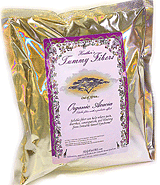
Organic Acacia
Soluble Fiber
The prebiotic fiber that reduces bloating & gas!

In this Issue...
Food & Recipes
Rx News & Research
Ask Heather
About Us
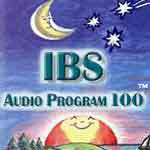
Gut-directed hypnosis is one of the most effective ways to help relieve all IBS symptoms! Results can last more than 5 years.

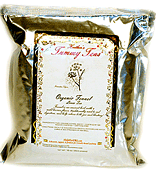
Fennel Tummy Tea for
IBS Bloating & Gas
Fennel has anti-spasmodic properties and is the best for relieving bloating and gas!
Our one-pound bag equals more than ten boxes of tea bags, and has a high volatile oil content for a super strong and effective brew.
Did you miss the latest
IBS newsletter and
Italian Bread Salad?
Past issues
are posted here!
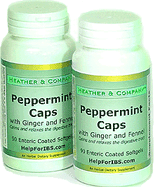
Try Peppermint Caps
Peppermint Oil Caps are the best for abdominal spasms, cramps and pain.
Our caps also have fennel and ginger oils, for extra digestive benefits!
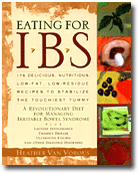
Delicious Recipes
for IBS!
Learn how to eat well and feel better

The IBS Diet Kit #2!
With Eating for IBS, plus peppermint caps to prevent spasms and pain, plus Acacia Tummy Fiber to start stabilizing immediately.
Take control of your IBS!
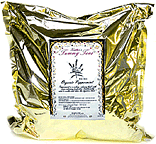
Try Heather's
Peppermint Tummy Tea
Peppermint is a smooth muscle relaxant and has pain-killing properties. Our tea is large leaf with a high volatile oil content - much stronger than tea bags!
|
 |
|
| |

Did your email mangle this newsletter? Copy and paste this address into your browser window:
http://www.helpforibs.com/news/newsletter/chocsilk092804.html or click here to see it online.
September 28, 2004
Hello to everyone -
It's time for a decadent chocolate dessert! This week we've got one of the most popular IBS recipes ever - Chocolate Silk Pudding. This one's a favorite of everyone who misses the creamy, rich, chocolate-y puddings of their childhoods. If you thought you'd never again enjoy this old-fashioned comforting treat, surprise! It's a cinch to make traditional pudding recipes IBS-safe by simply replacing the dairy with soy or rice milk, and using only egg whites instead of whole eggs. Substituting unsweetened baking cocoa for solid chocolate lowers the fat content even further, while keeping every bit of the deep, dark chocolate flavor.
There's a special twist to this week's newsletter - check the "Ask Heather" column below to find out! And remember, there are just two newsletters left before we're off to the IBS Vegas Fall Sprawl, so check for last-minute travel bargains and you can attend what is sure to be a terrific and truly unique event. As always, we have a wealth of new digestive health research findings too. Enjoy!
Best Wishes,
Heather Van Vorous
Did a friend send you this newsletter? Sign up here for your own free subscription.

Chocolate Silk Pudding
Makes 6 Servings
3 tablespoons Acacia Tummy Fiber (optional)
6 tablespoons granulated sugar
1/2 cup unsweetened cocoa powder
6 tablespoons cornstarch
dash salt
3 cups vanilla soy/rice milk (don't use Silk brand - it won't thicken)
6 tablespoons dark corn syrup such as Karo (this is not high fructose corn syrup)
3 organic egg whites
1 tablespoon vanilla extract
In a small bowl beat the egg whites until lightly frothy. Set aside.
In a heavy, large double boiler whisk together all ingredients to salt. Gradually whisk in the milk and corn syrup, and scraping around the bottom and edges of the pan with a rubber spatula until thoroughly blended. Set pan over boiling water and cook, whisking constantly until the mixture reaches a full boil. Continue whisking for one more minute, and remove from heat.
Carefully whisk several very large spoonfuls of hot pudding into the egg whites to temper (warm without scrambling) them. Add the egg mixture back to the pan of pudding and whisk well to thoroughly blend.
Return the pan to the heat and whisk constantly for one minute until mixture thickens. Remove from heat and whisk in vanilla extract. Pour into six serving glasses and chill until cold.
For oodles of other delicious recipes, come visit the IBS Recipe Exchange board!
Are you just learning how to eat for IBS? A little intimidated at the thought of special IBS recipes? Not quite sure just what makes these recipes special in the first place? Don't worry! Come see
the IBS Diet pages, and find the answers to all your questions.
 What Differentiates Chronic Constipation From IBS With Constipation?
What Differentiates Chronic Constipation From IBS With Constipation?
The irritable bowel syndrome (IBS) and chronic constipation (CC) are 2 of the most common conditions seen in primary care offices and are among the most common reasons for gastroenterology referral in the United States. IBS is a functional gastrointestinal disorder in which altered motility, abnormal visceral sensation, and psychosocial factors interplay to cause symptoms. Because of the overlap in symptoms reported by patients with IBS and a predominant bowel complaint of constipation (IBS-C) and CC, clinicians often find it challenging to differentiate between these 2 disorders. This Clinical Update will focus on the epidemiology, clinical and economic impact, and diagnosis and management of patients with chronic constipation. Important differences between CC and IBS-C will be highlighted in order to emphasize the differential diagnostic and management approaches to the 2 conditions.
Check here for more
information...
Treatment Options in Irritable Bowel Syndrome
Irritable bowel syndrome (IBS) is part of the spectrum of functional bowel disorders characterised by a diverse consortium of abdominal symptoms including abdominal pain, altered bowel function (bowel frequency and/or constipation), bloating, abdominal distension, the sensation of incomplete evacuation and the increased passage of mucus. It is not surprising therefore that no single, unifying mechanism has as yet been put forward to explain symptom production in IBS. The currently favoured model includes both central and end-organ components which may be combined to create an integrated hypothesis incorporating psychological factors (stress, distress, affective disorder) with end-organ dysfunction (motility disorder, visceral hypersensitivity) possibly aggravated by sub-clinical inflammation as a residuum of an intestinal infection.
There is currently no universally effective therapy for IBS. Standard therapy generally involves a symptom-directed approach; anti-diarrhoeal agents for bowel frequency, soluble fibre or laxatives for constipation and smooth muscle relaxants and anti-spasmodics for pain. New drug development has focused predominantly on agents that modify the effects of 5-hydroxytryptamine (5-HT) in the gut, principally the 5-HT3 receptor antagonists for painful diarrhoea predominant IBS and 5-HT4 agonists for constipation predominant IBS. More speculative new approaches include anti-inflammatory agents, antibiotics, probiotics, antagonists of CCK1 receptors, tachykinins and other novel neuronal receptors.
Check here for more
information...
Cranberry Juice Found to Help Prevent Peptic Ulcers
Using cranberry juice for urinary tract infections has been known for a while, with recent studies showing a 20% decreased risk in urinary tract infections in women. The role for cranberry juice in helping promote health and prevent disease has now been broadened to include peptic ulcers. A new study in Food Nutrition and Science found that a high-molecular-weight constituent in cranberry juice is able to prevent the bacteria Helicobacter Pylori from binding to the lining of the stomach.
H. pylori weakens the protective mucous coating of the stomach and duodenum, which allows acid to get through to the sensitive lining beneath. H. pylori is able to survive in stomach acid because it secretes enzymes that neutralize the acid. This mechanism allows H. pylori to make its way to the "safe" area of the protective mucous lining. The bacterium's spiral shape then allows it to burrow through the lining, causing a sore, or ulcer
Check here for more
information...
Yogurt and Gut Function
In recent years, numerous studies have been published on the health effects of yogurt and the bacterial cultures used in the production of yogurt. In the United States, these lactic acid-producing bacteria (LAB) include Lactobacillus and Streptococcus species. The benefits of yogurt and LAB on gastrointestinal health have been investigated in animal models and, occasionally, in human subjects.
Some studies using yogurt, individual LAB species, or both showed promising health benefits for certain gastrointestinal conditions, including lactose intolerance, constipation, diarrheal diseases, colon cancer, inflammatory bowel disease, Helicobacter pylori infection, and allergies. Patients with any of these conditions could possibly benefit from the consumption of yogurt. The benefits of yogurt consumption to gastrointestinal function are most likely due to effects mediated through the gut microflora, bowel transit, and enhancement of gastrointestinal innate and adaptive immune responses.
Check here for more
information...
Looking for yogurt without the dairy? Try soy yogurt instead! Looking to enhance the effects of the bacterial cultures in yogurt? Take a prebiotic soluble fiber at the same time to encourage growth of the probiotics!
Nut Consumption and Decreased Risk of Gallbladder Removal
Researchers followed the diets and health of more than 80,000 women over the period 1980 - 2000 by means of questionnaires mailed to them every 2 years. The authors of the study, from Harvard and Brigham and Women's Hospital in Boston, were investigating whether including nuts in the diet is associated with reduced risk for gallbladder removal, a common surgical procedure. The participants were women in the Nurses' Health Study, between ages 30 - 55 and had no previous history of gallbladder disease. They reported on their dietary intake of nuts (including peanuts, peanut butter and other nuts) and whether they had undergone surgery for gallbladder removal.
After controlling for other risks of gallbladder disease, it was found that women who ate nuts 5 or more times per week had a 25 percent lower risk of cholecystectomy compared with women who ate nuts rarely or never. In addition, the study noted that women who consumed the most nuts, tended to weigh less, indicating that the energy contained in nuts tends to be balanced by reduced intakes of other calorie sources or by increased activity.
Check here for more
information...
Not sure how to eat nuts safely for IBS? Check the recipes in Eating for IBS for lots of delicious examples!
Yoga and Irritable Bowel Syndrome
If you suffer from Irritable Bowel Syndrome, yoga can help alleviate symptoms and keep stress in check. IBS has often been dismissed as psychosomatic, but recently it has been redefined as "a disorder with variable symptoms having possible neurological, immunological, or psycho-emotional roots," says Gary Kraftsow, founder of American Viniyoga Institute and author of Yoga for Transformation.
Without any known organic cause or cure for IBS, treatment primarily focuses on symptom relief. Medications like antidiarrheals, antispasmodics, or tricyclic antidepressants can be helpful when symptoms are overwhelming. Yet research has suggested that lifestyle modifications can also be an effective method of easing the pain. A Mayo Clinic study in the American Journal of Gastroenterology (February, 1998) showed that exercise, diet, and stress management reduced IBS symptoms. "The Mayo study shows people do better if they use active and positive coping strategies for pain," says Bruce Naliboff, Ph.D., a functional disorders and pain specialist at the UCLA Center for Integrative Medicine and West Los Angeles VA Health Care Center.
Abdominal breathing in particular has proven helpful in IBS sufferers, and deep inhalations and exhalations may benefit those who breathe shallowly when stressed or swallow air while eating or talking, trapping air in the stomach.IBS sufferers often battle bowel habits that are painful and unpredictable. During a flare-up, Kraftsow recommends concentrating on postures that provide a soothing effect. He suggests forward bends and simple abdominal twists like Jathara Parivrtti (a revolved twist) and Apanasana (a knee-to-chest pose), which may help soothe a hyperactive bowel or stimulate a sluggish one. For constipation, you can stimulate digestion by working the abdomen more strongly in Uttanasana (Standing Forward Bend) or PParivrtta Trikonasana (Revolved Triangle Pose); just move into the postures with the belly held in after releasing an exhalation.
Check here for more
information...
Check here for comprehensive information about yoga and Irritable Bowel Syndrome, and come visit the Yoga for IBS Message Board if you have any questions!
Looking for the latest IBS research and news?
Check out the IBS Research Library!
 What Would You Like To Ask Heather?
What Would You Like To Ask Heather?
"Which IBS issues would you like to see addressed?"
Okay, it's your turn! What would you like to know about IBS? Virtually all of the "Ask Heather" columns come from questions I hear asked by readers over and over again, and I'm always open to new ideas, so let me have 'em! Is there one particular aspect that you've never been clear about? Any specific issues, avenues, questions or correlations you've never seen discussed? Now's the time to let me know your question!
All of the past "Ask Heather" columns are archived on the site in the IBS Newsletters, and many of the most popular questions have been added to the IBS Diet FAQ or incorporated into the IBS Glossary. These are all terrific resources to check if you're looking for IBS issues that have already been addressed.
If you don't see what you're looking for, I've set up a special post on the IBS Message Boards where you can request a future "Ask Heather" topic. If you're not yet a member of the boards, you can register here. Once you've registered, just log in here, and then you can post. If you don't ask, I can't answer, so please come by the boards and make your voice count! I won't be able to directly answer your questions on the board, but I will use the topics for future "Ask Heather" columns.
One of the most popular previous IBS Newsletter columns was the Seven Sneaky Deadly Sins of the IBS Diet. Wondering what they all are? Check here...
1. Coffee (yes, decaf counts)
2. Yogurt (it's the safest dairy product for IBS...isn't it?)
3. Alcohol (just one glass of wine is okay, right?)
4. Vitamin supplements (they're good for you, aren't they?)
5. No insoluble fiber foods (they're triggers, so you just don't eat them, right?)
6. Too low a dosage of soluble fiber supplements
7. Not drinking enough water (doesn't soda pop count?)
 Heather & Company for IBS, LLC is dedicated to serving people with Irritable Bowel Syndrome. Our mission is to provide education, support, and products that allow people with IBS to successfully manage their symptoms through lifestyle modifications.
Heather & Company for IBS, LLC is dedicated to serving people with Irritable Bowel Syndrome. Our mission is to provide education, support, and products that allow people with IBS to successfully manage their symptoms through lifestyle modifications.
We offer extensive information and tangible help for IBS, including the world's best-selling and best-reviewed books for the disorder. We provide the internet's top IBS web site resources; a twice-monthly IBS Newsletter; seminars and classes; dietary brochures for patient distribution by health care professionals; an IBS Research Library; and Heather Cooks!, a healthy cooking show on Seattle television. Much of our work is based on Heather's development of the first and only comprehensive IBS dietary guidelines and recipes, an achievement which has earned numerous awards and accolades as well as thousands of thank you letters from IBS sufferers.
Heather & Company also provides the only patient-expert moderated IBS Message Boards on the internet with forums for diet, recipes, hypnotherapy, yoga, plus Crohn's and Colitis. In addition, we support and coordinate the formation and continuation of local in-person IBS support groups across the USA, Canada, the UK, Australia, and New Zealand. We will soon have other IBS services and products available.
Our website receives over 2.5 million visits each year, and our newsletter is sent to over 25,000 people. We are regular exhibitors at the Digestive Disease Week and American Dietetic Association conferences.
Sponsorship opportunities are available for the message boards and this newsletter for companies and/or products that have been legitimately established as helpful for digestive disorders.
Please contact us for information.

You are receiving this email because you have expressed interest in IBS news and information.
To unsubscribe from Heather's IBS Newsletter, click here http://www.helpforibs.com/news/unsub.asp or send an email to help@helpforibs.com.
Change your newsletter email address here.
If you are viewing this newsletter on a website and would like to subscribe for email delivery, please "Join the IBS Newsletter" here.
ANTI-SPAM PRIVACY POLICY
LEGAL DISCLAIMER - This email is not intended to replace the services of a physician, nor does it constitute a doctor-patient relationship. Any application of the recommendations in this email is at the reader's discretion. Heather Van Vorous and Heather & Company for IBS, LLC are not liable for any direct or indirect claim, loss or damage resulting from use of this email and/or any web site(s) linked to/from it. Readers should consult their own physicians concerning the recommendations in this email.
HelpForIBS.com
Heather & Company for IBS, LLC
80 S. Washington St, #304
Seattle, WA 98104 USA
© 2004 Heather & Company for IBS, LLC. All rights reserved.
|
|
|
|